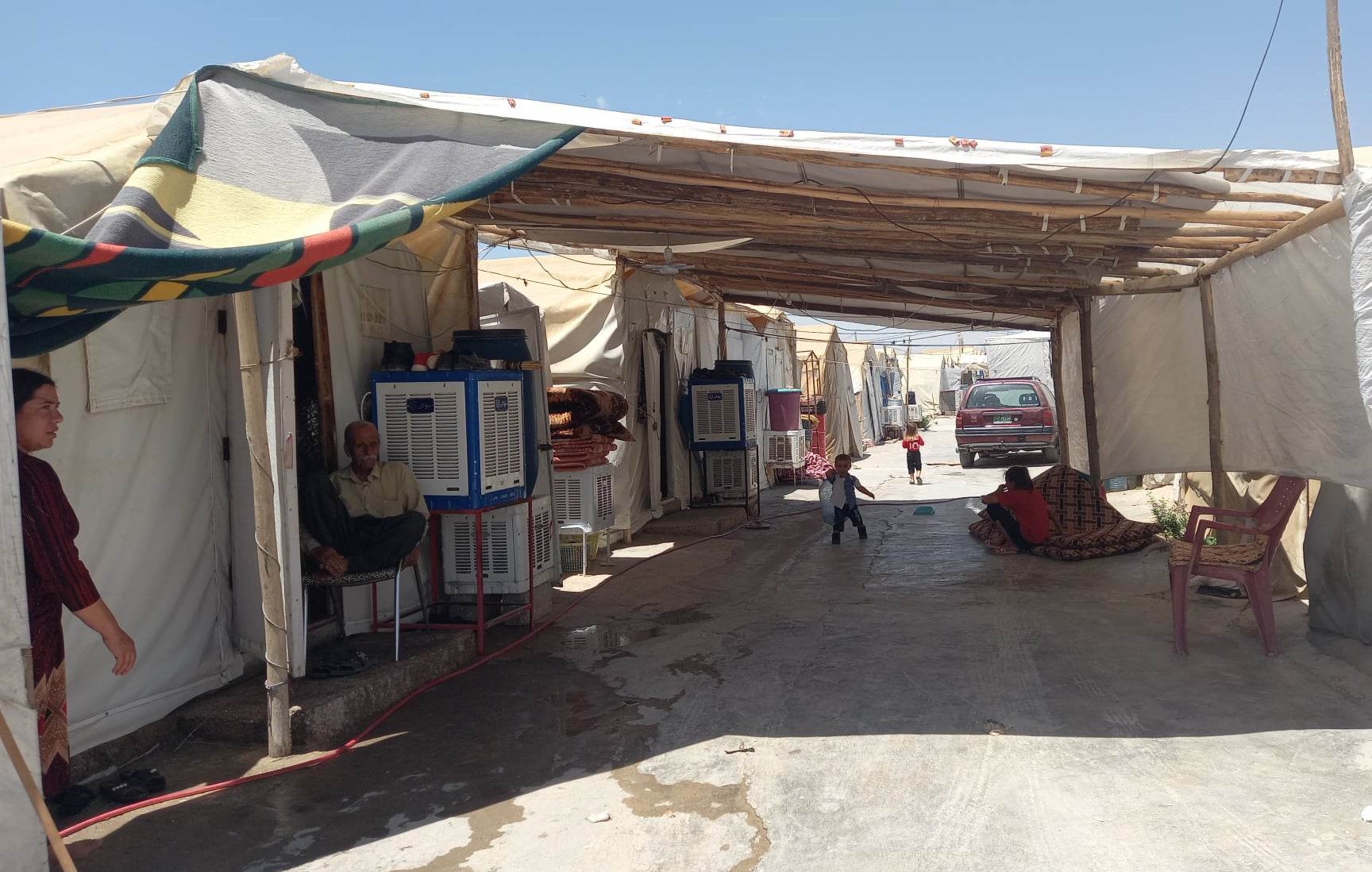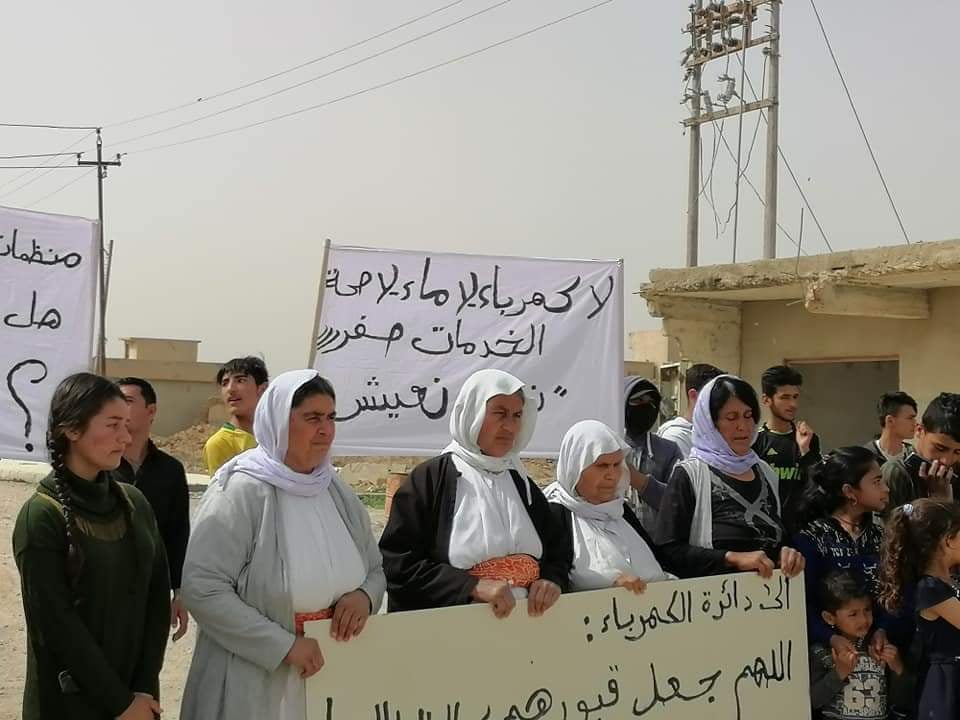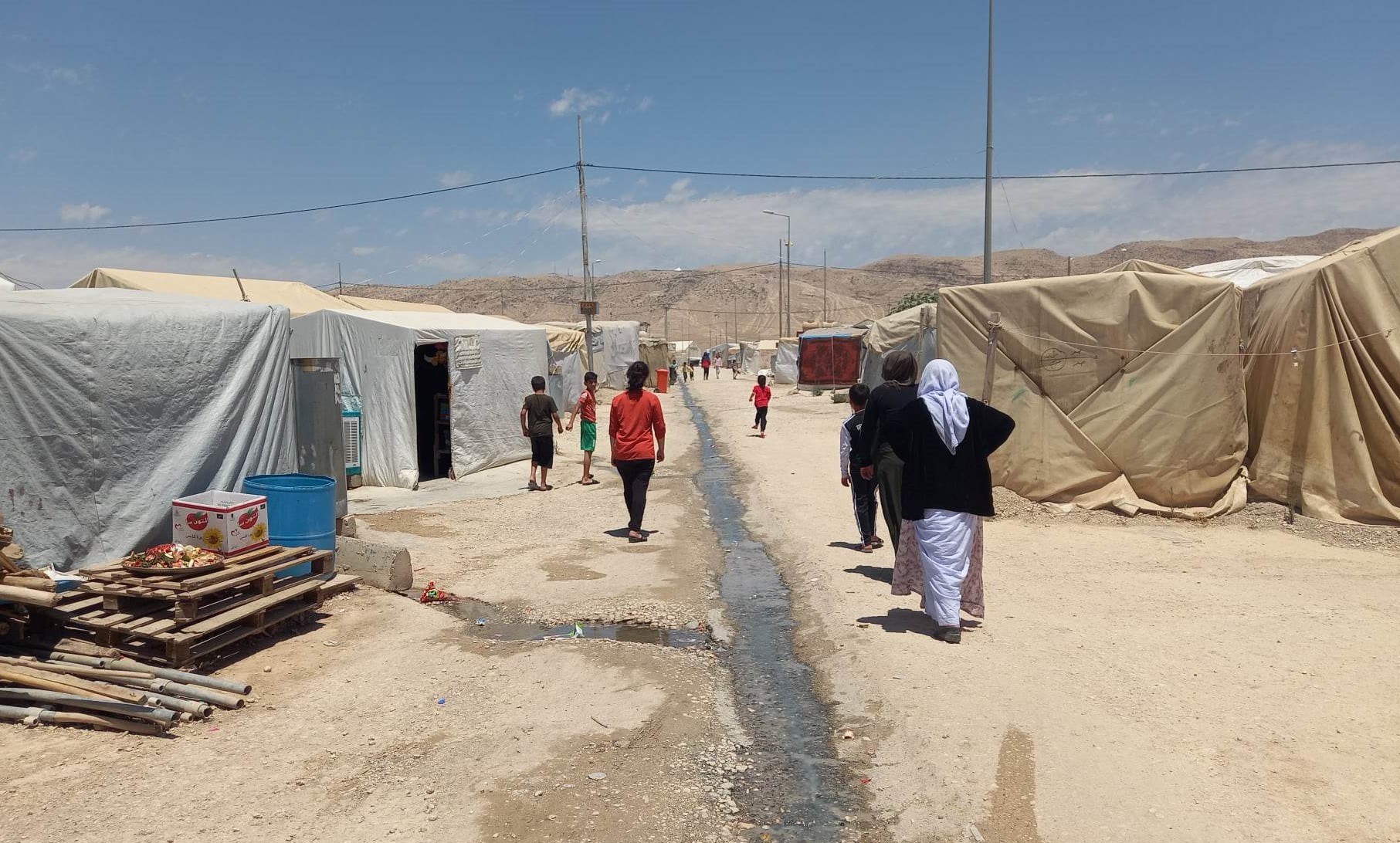Eido Khalaf and other Internally Displaced Persons IDPs living in the camps intend to return to their homes, but they refuse to return forcibly unless stability and services are restored to Shingal, home to the vulnerable Ezidi (Yazidi) ethnoreligious community.
The Iraqi government intends, within the framework of its ministerial platform, to close all camps for the IDPs, including the camps located in the provinces of the Iraqi Kurdistan Region IKR. The process has sparked mutual accusations between officials of the Iraqi federal government and the Erbil-base, semiautonomous Kurdistan Regional Government KRG.
“Big part of public services has not been restored yet, and most importantly, administrative and military issues remain pending, and we will not return until they are resolved,” Khalaf told KirkukNow.
Khalaf is from Sinjar and has been living for more than eight years in a camp for the IDPs in Duhok Northern Governorate.
There are 26 camps for the IDPs in the IKR, while all camps located in the areas under the authority of the federal government of Baghdad have been closed.
"The displaced do not want to stay in the Kurdistan Region. We are eager to return home, but I do not hide from you that our return is about to become a dream. Our displacement has lasted for more than eight years, after we used to say that it is several months and it will end," Khalaf bitterly added.
We feel that they want to force us to return to Shingal, and this is not our wish
"We are upset when we hear officials say that the displaced should return. We feel that they want to force us to return to Shingal, and this is not our wish."
There are more than 664,000 IDPs in the IKR, most of them from Nineveh Governorate, especially the Sinjar district, 30% of whom are Ezidis, in addition to that the fate of over 2,600 Ezidis who were kidnapped by ISIS is still unknown.
Shingal, 120 km west of Mosul, a disputed area in Ninewa province, was captured by ISIS on August 3, 2014, and thousands of people were killed, kidnapped and displaced until it was captured on November 13, 2015.

Sharya camp for the IDPs, mainly Ezidis, in Dohuk, 2021. KirkukNow
Pir Dian Jafar, director of the Department of Migration, Displacement and Crisis Response of the KRG in Dohuk – a state body oversees all Dohuk camps- told (KirkukNow), "During the past eight years, about 30 to 35% of the displaced people of Sinjar returned to their areas.”
“If the displaced receive support and aid, and the political, administrative and military problems are resolved, perhaps the percentage of returnees will reach 40& by the end of this year.”
There are 16 camps for the IDPs in Dohuk, which house more than 26,000 families, while more than 38,000 displaced families live outside the camps.
There are two administrations in Shingal; One works in Duhok Northern Province under the Kurdistan Regional Government KRG and the other in the center of the district, except for the self-governing council, which is considered close to the Kurdistan Workers' Party PKK.
The Shingal agreement signed in 2020 between the federal government and the KRG to reorganize the administration, security and services, but has not been implemented yet.
“The return of the displaced is slow. Only 40 families returned last week, and in some weeks no family returns because of the lack of services and the failure to solve problems,” Jafar added.
The official in the regional government stressed the return process is completely voluntarily and optional, not compulsory.
“We will not forcibly send back any displaced family to Sinjar. We will continue to serve them as long as they are here, and any displaced person wants to return, he is free, and we will not hinder his return," according to Jafar.
This comes while the Iraqi Ministry of Migration and Displacement last month accused the authorities in the KRG of preventing the displaced from returning.
Evan Faeq Gabro, the Iraqi Minister of Migration and the Displaced, stated during two television interviews with Al-Rasheed and Al-Iraqiya TV channels last April that “closing the camps has become a political issue, while if there is a real will, they can be closed and their residents returned to their areas.”
“We have no authority over the camps of the Kurdistan Region. They always talk about hosting the displaced, we thank them for that, but you should not close the door on the guests,” referring to preventing the return of the displaced.

The KRG Ministry of Interior responded directly to the accusations of the Minister of Immigration and stressed in a statement that "the main reason behind the non-return of the displaced in the first place is the presence of a number of illegal forces in the Sinjar region and the failure to implement the terms of the Sinjar Agreement between the regional government and the federal government regarding the normalization of conditions in Sinjar."
The implementation of the provisions of the Sinjar Agreement has also been fixed in the government program with the aim of establishing security and stability in the district and the region in general.
In the Ezidi-dominant region of Shingal, only three thousand square kilometers, Baghdad federal and Erbil regional governments compete to establish their rule: three local administrations want to administer the district where five different armed forces are deployed.
The militant groups are Iran-backed PMF, Shingal Resistance Units YBS or YBSh and Ezidkhan Asayish, affiliated to the Kurdistan Workers Party, fighting Turkey and holding territories north of Iraq, federal and local Police, Iraqi army and the Kurdistan Regional Government's KRG Peshmerga.
Sargon Fyador Hanna, director of the Iraqi Department of Migration and Displacement in Dohuk, told KirkukNow, "We absolutely reject the forced return of the displaced, and no such decision has been issued. There is only voluntary return, and we provide them with facilities."
the closure of the camps is not compulsory, and as long as there are displaced people
Every displaced family wishing to return must submit their documents to the Department of Migration and Displacement of the KRG, and then obtain a letter from the Iraqi Immigration Department to receive an amount of 1,5 million Iraqi Dinars IQD (USD1,000) as aid for the returnees.
"No camp will be closed in Dohuk and other regions, as soon as the camps are empty of the displaced, then they will be closed, but the closure of the camps is not compulsory, and as long as there are displaced people, we will continue to serve them," the Iraqi government official confirmed.
According to federal government statistics, more than 55 camps for the displaced have been closed so far, the last of which was Al-Jad’a 5 camp in Nineveh, which was completely emptied of the displaced last April.
Sharif Suleiman, head of the Migration and Displacement Committee in the Iraqi parliament, told KirkukNow, "The Ministry of Migration and Displaced has not taken serious steps to return the displaced. What is being said about providing aid and support to the displaced are mere rumors that have not been translated into practical steps."
Suleiman believes that persuading the displaced to return and resolving the problems in Nineveh depends on the implementation of the Sinjar agreement concluded between Erbil and Baghdad.
According to (KirkukNow) follow-ups, families in the camps suffer from the lack of aid, scarcity of drinking water and poor quality of foodstuffs distributed to them by the Iraqi government.
Ali Omar Ga’bo, the deputy governor of Nineveh for displaced people and organizations, told KirkukNow, "There is no official practical step to close the camps in Dohuk province, and we have not received anything in this regard."
He explained that "the procedures for the return of the displaced are not difficult," as it requires the displaced to review the immigration departments or camp administrations, and there they are issued a letter of return. All return procedures "run without delay within a short period."
Six million Iraqi citizens were displaced from their areas due to the ISIS war and the military operations of the Iraqi forces in the period from 2014 to 2017, and according to the statistics of the International Organization for Migration IOM, more than one million Iraqis are still living in displacement, including the displaced residing in the camps of the IKR.






